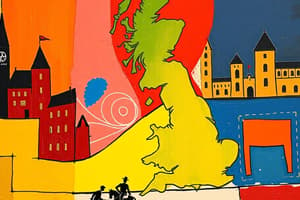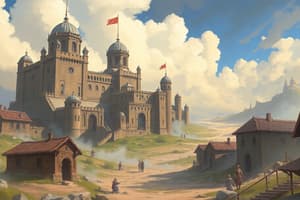Podcast
Questions and Answers
What characterizes the society in the Neolithic period?
What characterizes the society in the Neolithic period?
- Nomadic hunting-gathering cultures
- Sedentary agricultural village society (correct)
- Urbanized industrial society
- Feudal agrarian society
Which time period spans from 476 AD to 1450?
Which time period spans from 476 AD to 1450?
- Ancient period
- Contemporary period
- Modern period
- Medieval period (correct)
During which time period did 'civilization' emerge worldwide?
During which time period did 'civilization' emerge worldwide?
- Contemporary period (correct)
- Paleolithic period
- Ancient period
- Neolithic period
What type of society existed during the Paleolithic period?
What type of society existed during the Paleolithic period?
Which region is primarily associated with the Ancient period?
Which region is primarily associated with the Ancient period?
Why is Darwin's theory of evolution referred to as a 'dangerous idea'?
Why is Darwin's theory of evolution referred to as a 'dangerous idea'?
What aspect of society does Darwin's evolutionary theory influence?
What aspect of society does Darwin's evolutionary theory influence?
What fear is associated with Darwin's theory of evolution?
What fear is associated with Darwin's theory of evolution?
Which of the following represents a common misconception about human evolution according to Darwin's theory?
Which of the following represents a common misconception about human evolution according to Darwin's theory?
What is a potential implication of Darwin's idea of evolution on cultural beliefs?
What is a potential implication of Darwin's idea of evolution on cultural beliefs?
How have Darwin's ideas been misused historically?
How have Darwin's ideas been misused historically?
What does the idea of evolution imply about human beings?
What does the idea of evolution imply about human beings?
What caution is associated with interpreting Darwin's theory of evolution?
What caution is associated with interpreting Darwin's theory of evolution?
What is a key implication of the web of life concept related to evolution?
What is a key implication of the web of life concept related to evolution?
What is one goal of the course mentioned regarding Darwin's theory?
What is one goal of the course mentioned regarding Darwin's theory?
Study Notes
Historical Time Periods
- Contemporary Period: Spans from 1945 to present, characterized by a global view of "civilization."
- Modern Period: Covers 1450 to 1945, primarily focused on Western culture and developments in Europe.
- Medieval Period: Lasts from 476 AD to 1450, marked by the influence of Western culture in the Mediterranean region.
- Ancient Period: Extends from 4,000 BC to 476 AD; focused on developments in the Middle East.
Prehistoric Eras
- Neolithic Period: Occurred around 10,000 years ago to 6,000 years ago, featuring sedentary agricultural village societies in the Middle East.
- Paleolithic Period: Lasted from 2.5 million years ago to about 10,000 years ago, characterized by nomadic hunting-gathering cultures present worldwide.
Introduction to Darwin's "Dangerous Idea"
- The course explores key terms such as "biological knowledge," geological and cultural evolution, and historical timescales.
- Charles Darwin (1809–1888) is recognized as the founder of the theory of evolution by natural selection, which has significantly influenced cultural and scientific discourse.
- Darwin’s theory suggests that humans evolved from apes, conflicting with certain religious beliefs, leading to perceptions of the theory as "dangerous."
- Evolutionary theory has implications beyond biology, suggesting society has "evolved" from primitive to advanced stages, influencing societal views and technology development.
Societal Implications of Evolution
- Arguments arise questioning whether non-technological societies are less "evolved" and justify the domination of these groups based on perceived evolutionary inadequacies.
- Misinterpretation of evolution has led to claims of superiority among certain groups, often resulting in oppression and unethical practices.
- The term “survival of the fittest,” while rooted in science, can be misapplied to advocate for immoral ideologies.
Dual Nature of Ideas
- Ideas have the potential to be both dangerous and beneficial, influencing moral judgments and societal structures.
- Darwin’s theory implies a shared ancestry among all humans and a connection to other life forms, fostering a sense of interdependence within the web of life.
- This interconnectedness emphasizes the need for compassion and care for one another and the environment, contrasting against interpretations that promote selfish competition.
Importance of Interpretation
- The effectiveness of ideas, including Darwin’s evolutionary theory, depends on how they are interpreted and applied in society.
- A deeper understanding of Darwin's work aims to clarify misconceptions and provide valid interpretations that foster greater awareness of interconnections among life forms and environmental issues.
- The course seeks to equip students with the knowledge necessary for personal development and a more accurate comprehension of evolutionary science and its implications.
Studying That Suits You
Use AI to generate personalized quizzes and flashcards to suit your learning preferences.
Description
This quiz explores various historical time periods from the Ancient to the Contemporary period, along with key prehistoric eras such as the Neolithic and Paleolithic periods. Test your knowledge on the defining characteristics and timelines of these significant phases in human history.




